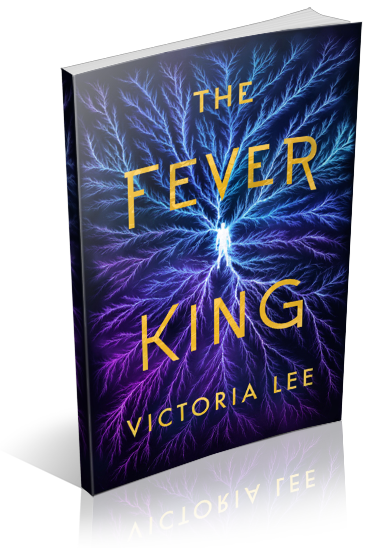

Lee tends to overwrite certain moments, particularly conversations. THE FEVER KING does suffer from some first-novel jitters. To borrow a phrase from The Princess Bride, Victoria Lee isn’t writing to the death in THE FEVER KING, she’s writing to the pain.

While I sometimes find these types of insertions annoying, here they were a fascinating glimpse into what went wrong in the United States and Lehrer’s own abuse at the hands of the United States government. Scattered throughout the novel are ‘found documents’ that fill in some of Lehrer’s backstory. The worldbuilding in THE FEVER KING will also draw readers in. She weaves together reveals and twists and there were a number of moments when I was genuinely uncertain where the story would go, which I appreciated. Lee’s prose is effective and Noam’s discovery of the extent of the corruption and power at play around him will keep readers hooked. As Noam gets closer to Dara and more entangled in Lehrer’s plot, Noam must puzzle out questions of power and consent, in both the personal and political realms and ask himself what the cost of the revolution will be. Lehrer also mentors another student, Dara Shirazi, who is brooding and damaged in ways that Noam can’t quite grasp. And the best part is that Lehrer seems to have the same idea. Noam sees Lehrer’s offer as his chance to take down the current government, which has relentlessly persecuted refugees like his family. Lehrer, the man who brought down the United States government over 100 years ago, currently serves as the Minister of Defense in the kingdom of Carolinia. The virus that kills his father makes Noam a powerful ‘witching’ and he’s personally recruited by Calix Lehrer, the most powerful witching alive. THE FEVER KING begins when a magical outbreak sweeps through the slums of the Durham, leaving Noam Álvaro is the lone survivor. However, Lee’s strong prose and stronger characterization elevate it past a mere statement to something more. Instead THE FEVER KING is interested in politics as the mechanism used to manage difficult, international situations like the refugee crisis at the heart of the story. I think the question of how topical a novel is a little wearying (especially given the long slog to publication) and I want to be clear that when I say political, I don’t mean ‘Democrat’ or ‘Republican’. THE FEVER KING is unabashedly political in its exploration of power, identity, and sexual abuse it certainly won’t be everyone’s cup of tea. So when I characterize this novel as dark and unsettling, I have to believe that Lee would take that as a complement.

To borrow a phrase from The Princess Bride, Victoria Lee isn’t writing to the death in THE FEVER KING - she’s writing to the pain.


 0 kommentar(er)
0 kommentar(er)
